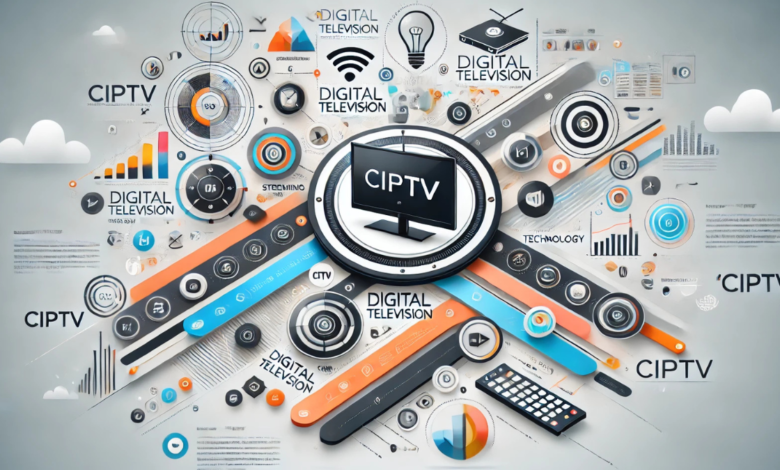The world of television is rapidly changing, and one of the most exciting innovations to emerge in recent years is cIPTV (consumer IPTV). Traditional cable TV and satellite systems are being increasingly replaced by internet-based television services. In this article, we will explore the concept of cIPTV, its benefits, challenges, and future prospects, providing an in-depth look at why it’s poised to revolutionize the way we consume media.
What is cIPTV?
cIPTV, or consumer IPTV, is a type of television service delivered over the internet through a protocol known as the Internet Protocol (IP). Unlike traditional television signals transmitted via satellite or cable, cIPTV uses the internet to stream content directly to devices such as smartphones, smart TVs, tablets, and computers. Essentially, it’s TV streaming that bypasses the traditional broadcasting infrastructure.
One of the biggest advantages of cIPTV is its reliance on IP networks, making it much more flexible and scalable compared to older broadcast systems. It delivers both live and on-demand content, offering users the ability to watch their favorite shows, movies, and sports events whenever they want. cIPTV has revolutionized the concept of TV viewing by allowing people to access entertainment without being tied to fixed schedules or geographical constraints.
The technology behind cIPTV is based on internet streaming rather than satellite or cable transmission. It offers consumers a personalized experience, where they can choose from a wide array of content across multiple devices. Whether you’re watching on a smart TV in your living room or on your smartphone while traveling, cIPTV makes it easy to enjoy high-quality entertainment anywhere.
Benefits of cIPTV

One of the standout features of cIPTV is its ability to offer higher-quality content. With the rise of HD and 4K streaming, cIPTV has enabled viewers to experience television in a way that was once impossible with traditional TV services. With a stable internet connection, users can watch their favorite shows in crystal-clear resolution, bringing cinematic quality directly into their homes.
Another major benefit is the flexibility that cIPTV provides. Unlike cable TV, which often requires you to choose from fixed packages and channels, cIPTV services allow viewers to pick and choose exactly what they want to watch. Subscriptions can be tailored to fit individual needs, with options for pay-per-view, subscription-based models, or bundles offering a variety of channels. This flexibility ensures that users are only paying for the content they actually watch, making cIPTV a more cost-effective solution compared to traditional cable TV.
Moreover, cIPTV allows for greater accessibility. Content can be streamed on multiple devices, meaning that you can start watching a show on your TV and continue on your tablet or smartphone without losing progress. The variety of available devices further enhances user experience, providing an integrated approach to entertainment. Additionally, cIPTV often includes features like live pause, rewind, and fast-forward, allowing you to interact with content in ways that traditional TV doesn’t offer.
Challenges and Drawbacks of cIPTV
While cIPTV offers many advantages, it is not without its challenges. One of the primary issues is the dependence on a stable internet connection. Streaming high-quality video requires a significant amount of bandwidth, and if your internet connection is slow or inconsistent, the viewing experience can be disrupted with buffering, poor quality, or dropped connections. This is especially problematic in areas where high-speed internet is not widely available.
Another challenge is content protection and piracy. Since cIPTV relies on the internet for distribution, it’s more vulnerable to illegal streaming and piracy. While content providers use various encryption and digital rights management (DRM) technologies to protect their material, pirated content can still make its way into the market. This presents significant legal challenges and may affect the licensing and availability of content, as providers need to ensure their material is protected.
Compatibility can also be an issue, as not all devices support cIPTV services. Some older smart TVs or set-top boxes may not be compatible with the latest streaming technologies, limiting access to certain features or channels. Furthermore, different cIPTV providers may use different platforms, leading to incompatibility issues and making it harder for users to switch services.
Lastly, cIPTV is not available in all regions. Due to licensing agreements, some content may be restricted geographically, preventing users from accessing the same media in different countries. This limitation can be frustrating, particularly for international viewers who may not have access to the content they want to watch.
The Future of cIPTV
The future of cIPTV looks promising, with several technological advancements and trends set to shape the landscape of television. One of the most significant factors contributing to the growth of cIPTV is the rise of 5G networks. With faster speeds and reduced latency, 5G technology will allow for even higher-quality streaming, including 8K content, and a more seamless viewing experience. The ultra-fast data transmission capabilities of 5G are expected to revolutionize mobile streaming, making it even more convenient for viewers to enjoy content on the go.
Artificial intelligence (AI) also plays a significant role in the future of cIPTV. AI can be used to improve content recommendations, allowing viewers to discover new shows and movies based on their preferences. Additionally, AI-powered algorithms can optimize streaming quality by adjusting the resolution based on available bandwidth, ensuring a smooth viewing experience even with fluctuating internet speeds.
Another exciting development in the world of cIPTV is the integration of virtual reality (VR) and augmented reality (AR). As these technologies continue to evolve, we can expect to see immersive viewing experiences that go beyond traditional screens. Imagine watching a live concert or sports event in VR, where you feel as if you’re in the front row or sitting courtside. The potential for VR and AR in cIPTV is limitless, offering viewers an entirely new way to experience their favorite content.
Conclusion
In summary, cIPTV represents a major shift in the way we consume television content. With its high-quality streaming, flexibility, and accessibility, it offers a compelling alternative to traditional cable and satellite TV. However, it also faces challenges, such as the need for a stable internet connection, content piracy, and compatibility issues. Despite these hurdles, the future of cIPTV looks bright, with advancements in 5G, AI, and immersive technologies paving the way for an even more dynamic viewing experience.
As cIPTV continues to evolve, it will undoubtedly shape the future of television, offering a more personalized and interactive experience for users worldwide. Whether you’re a cord-cutter or just exploring new ways to enjoy TV, cIPTV has something to offer everyone.
FAQs
- What is the difference between IPTV and cIPTV?
- cIPTV is a specific type of IPTV that focuses on consumer-grade internet television, providing users with greater flexibility and personalization in their viewing experience.
- Do I need a special device to access cIPTV?
- No, you can watch cIPTV on a variety of devices, including smart TVs, smartphones, tablets, and computers, as long as they support the service you’re subscribed to.
- Can I watch cIPTV on my smartphone or tablet?
- Yes, cIPTV services are designed to be accessible on mobile devices, allowing you to watch your favorite content on the go.
- Is cIPTV available worldwide?
- While cIPTV services are widely available, content availability may vary depending on your location due to licensing agreements.
- How can I ensure a smooth cIPTV streaming experience?
- Ensure you have a high-speed internet connection with sufficient bandwidth, and check that your device is compatible with your chosen cIPTV service.
- Is cIPTV cheaper than traditional cable TV?
- In many cases, yes. cIPTV allows for more flexible subscription models, potentially saving you money compared to traditional cable TV packages.
- Can I access live sports and news on cIPTV?
- Yes, many cIPTV services offer live sports and news channels, though availability may depend on the provider and region.
- What are the security concerns with cIPTV?
- Piracy and content protection are ongoing challenges, but encryption and DRM technologies are employed to secure content.
- Will 5G improve my cIPTV experience?
- Yes, 5G will provide faster speeds and lower latency, improving the quality and reliability of streaming.
- How can content creators benefit from cIPTV?
- Content creators can reach a global audience and offer interactive and personalized experiences, increasing viewer engagement and monetization opportunities.
You May Also Read:https://ventweekly.com/breaking-ac/






